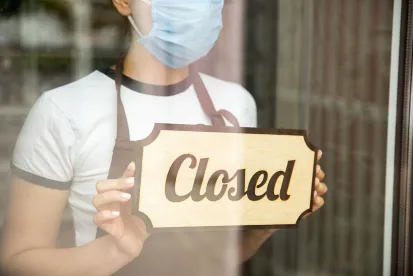On June 1, 2022 the Wisconsin Supreme Court unanimously found that the Plaintiffs – a group of bars and restaurants led by named Plaintiff Colectivo Coffee – did not have insurance coverage for the financial losses they suffered from the COVID-19 shutdown. This is the first ruling on COVID coverage by our Supreme Court.
Colectivo and the group of various bars and restaurants that joined together in the action sought coverage under the property insurance policies they received from Society Insurance. They claimed that the COVID-19 particles and the government shutdown order issued in March of 2020 caused a loss of use of their premises and lost business income. Society denied the claim, and Colectivo and company sued. Society moved to dismiss the suit but a Milwaukee County trial court denied the motion, finding that the allegations brought were sufficient to state a claim and raise an issue of coverage under the policy. Society appealed straight to the Wisconsin Supreme Court.
The issues on appeal were these: (1) whether a bar or restaurant’s inability to use its dining space for in-person dining because of the pandemic and related government restrictions constitutes a direct physical loss of or damage to its property and (2) whether the presence of COVID-19 on a bar or restaurant’s property caused the bar or restaurant to suspend its operation thereby entitling it to coverage under the policy’s contamination provision.
The Supreme Court determined that neither the COVID particles nor the government restrictions caused “direct physical loss or damage to” covered property. To be a loss, the Society policy required that some property be physically damaged or destroyed, not just restricted from use. Here, none of the restaurants or bars sustained harm or damage to their physical space nor were repairs needed. Essentially, the Court found that a financial loss is not a physical loss. The Court noted that this was the “overwhelming majority” opinion of other courts in the country that have analyzed the issue.
On the second issue, Colectivo argued that the policy covered “contamination,” which the policy defined as a “dangerous condition in your products, merchandise and premises,” that “results in an action by a public health or governmental authority that prohibits access to the property or production of the product.” Here, the Court reasoned that it was not the contamination by COVID particles that prohibited access; rather it was the government’s order restricting such access. The Court recognized that the bars and restaurants reopened once the state’s order was struck down later in 2020. Because the contamination by COVID particles was not what actually caused the loss, the contamination provision was not triggered.
Many companies suffered during the COVID pandemic, and in many cases, the financial impact has not only been significant, it remains ongoing. Unfortunately, this recent ruling may prevent using traditional property insurance as a viable option to recover or even offset these losses. However, contrary to the Wisconsin Supreme Court’s assessment, many other jurisdictions have found in favor of insurance coverage in similar situations, or have denied requests for a quick dismissal in favor of contested litigation (like the trial court did initially here). Conflicting results breeds fair legal questions, and ambiguities favor the policyholder. So COVID insurance coverage may not be completely dead in the water.
It is worth noting that insurance is not the whole story. Many companies accessed the Paycheck Protection Program for relief. Other businesses have looked to contractual protections, such as a force majeure clause, to lessen the hurt brought about by the pandemic. Some companies have sought commercial rent abatement based on provisions of their lease agreement. Of course regrettably, many businesses could not survive and had to shut down, but then bankruptcy protections become available.




 />i
/>i

